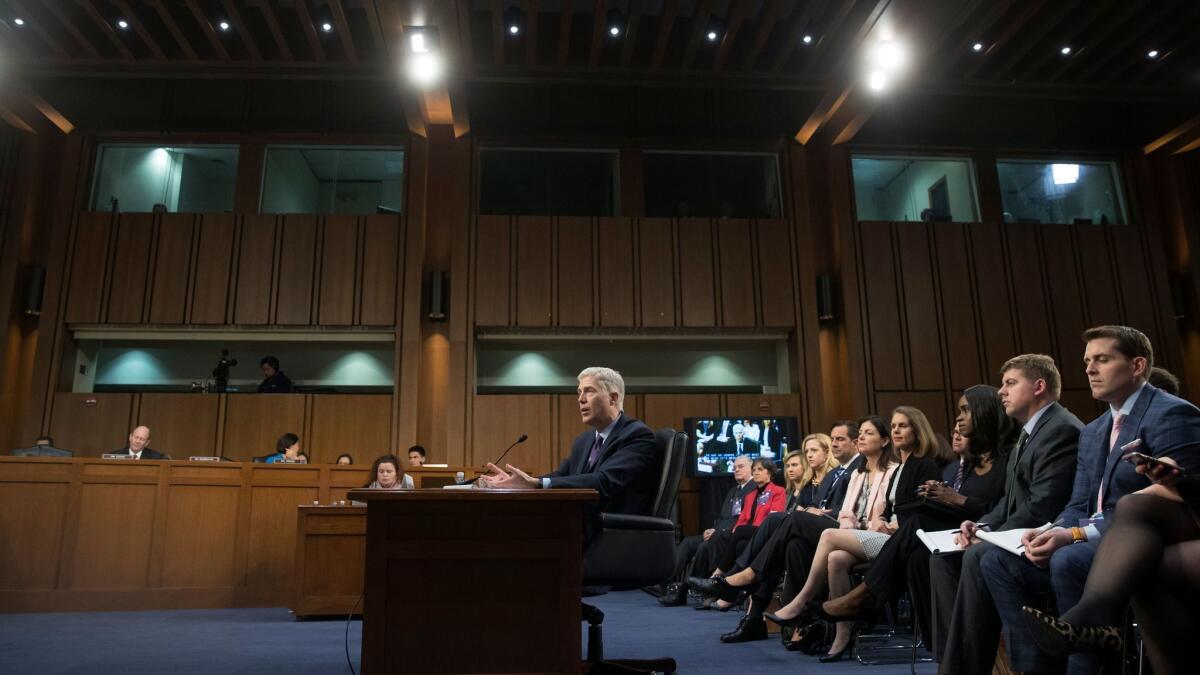Op-Ed: Can senators reject Gorsuch for purely political reasons? And other confirmation questions, answered

- Share via
This week’s Senate Judiciary Committee hearings on the nomination of Judge Neil Gorsuch to the Supreme Court provide an opportunity to ask basic questions about the hearing process itself. What follows is a quick Q and A about Qs and A’s.
Q: Are senators allowed to vote for or against a nominee for partisan or political reasons?
A: Yes. The politicization of this process is a feature, not a bug. Judges do not pick other judges; politicians do, thanks to a Constitution designed to accommodate a two-party system, a system reinforced by the 12th Amendment (adopted in 1804) and by a landmark congressional statute in 1842. The amendment facilitated a two-party presidential contest, and the statute encouraged a two-party congressional system. Presidents have historically picked justices from their preferred side of the political spectrum; senators are likewise free to take political affiliation into account. Judge Merrick Garland never even got a hearing, and Judge Neil Gorsuch is now getting a nice one for the simple reason that Republicans controlled the Senate last year and still control it. Elections matter.
Q: Do senators owe the president any special deference?
A: No. Historically, senators have given the president leeway in picking his Cabinet, especially at the outset of his administration — the traditional “honeymoon period.” But less deference has typically been given to a president’s judicial nominations. Even George Washington saw the Senate reject one of his top judicial picks (John Rutledge). This double standard makes good sense. Cabinet heads answer to the president and will leave when he leaves. The president should generally be allowed to choose his own executive-branch team. Judges are different. They occupy a separate and independent branch whose job routinely involves negating the president. They are not part of his team and will not leave when he leaves.
Justices have life tenure. A president can fire a naysaying Cabinet officer but cannot fire a justice who reneges.
Q: Should senators think twice before rejecting a nominee?
A: Yes. There is no guarantee if the nominee loses that the next nominee will be better (from the perspective of the naysaying senators). A clever president should follow up a “no” vote with a nominee whom obstructionist senators will like even less, but who will be harder, politically, to vote down.
Q: Can a president or senator ask the nominee for a promise about how the nominee will vote on the bench on any issue?
A: Absolutely not. A promise — whether public or private, to a senator or president or anyone else — would be a violation of legal ethics and judicial impartiality. A judge must keep an open mind while a case is pending and rule for the side that has the best legal claim, period. Also, any promise, even if made, would be unenforceable. Justices have life tenure. The confirmation process is political, but the adjudication process is not. A president can fire a naysaying Cabinet officer but cannot fire a justice who reneges.
Q: Can the nominee refuse to answer questions that might come before the court in the foreseeable future?
A: He can if the Senate lets him get away with that evasion. But in principle, this is the wrong line to draw. So long as a nominee makes no promise — and makes clear that he will change his mind if future legal arguments persuade him — there is nothing wrong with elaborating his views on any legal issue, even one that might come before the court tomorrow. Justices do this every day in judicial opinions. They take positions on today’s case that have implications for tomorrow’s fact patterns. But in most recent confirmations, nominees have ducked questions that might come before the court — and the Senate has meekly submitted.
Q: So what’s the point of hearings?
A: A cynic would say, face-time for senators and full employment for pundits. Less cynically, Americans can assess the temperament and learn the biographies of would-be justices. They can see how knowledgeable a nominee is and how he thinks on his feet. Even if a nominee refuses to answer questions about hypothetical future cases, he should be pressed to say what he thinks about decided cases. Eventually, hearings should become a two-part process in which the conversational component (akin to the court’s oral arguments) is followed by a writing phase (akin to the drafting of court opinions). In phase two, the nominee (with the help of handpicked law clerks) should be required to draft short concurring or dissenting opinions on a handful of previously decided Supreme Court cases — say, three from last year and three from earlier eras.
Akhil Reed Amar teaches constitutional law at Yale and is the author of “The Constitution Today: Timeless Lessons for the Issues of our Era.”
Follow the Opinion section on Twitter @latimesopinion or Facebook
ALSO
If we’re going to mine coal, we have to have state mine inspections
The U.S. government’s program to counter violent extremism needs an overhaul
If Trump wants to end the Russia investigation quickly, he should try cooperating
More to Read
A cure for the common opinion
Get thought-provoking perspectives with our weekly newsletter.
You may occasionally receive promotional content from the Los Angeles Times.










